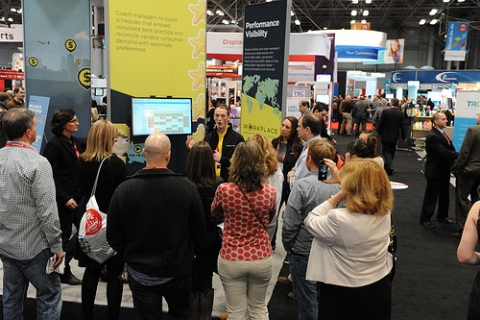National Retail Federation Grows Retail’s BIG Show the “Right Way”

The National Retail Federation’s annual show for the industry – Retail’s BIG Show – definitely takes after its moniker; The show IS big, in fact this year’s, which was held in January at the Jacob K. Javits Convention Center in New York City, broke all-time attendance records with 30,000 people, an uptick from 27,500 last year.
There also were 555 exhibiting companies, up from 494 last year, and 205,000 net square feet, up from 168,000 net sq. ft. last year.
But, even the though show is growing, Susan Newman, NRF’s senior vice president of conferences, and Mark Bogdansky, NRF’s vice president of exhibit operations, both said it’s done in a very specific way.
“At the Javits, we are in a very controlled growth situation,” Newman said. “We know what space we have for the next 3-4 years, and by 2016, we will max out the Javits.”
Bogdansky added, “We actually have had a waiting list for the last few years. We are really holding tight to this controlled growth.”
So, what do they mean exactly?
Because of the space limitations, Newman said they’ve had to carefully figure out how much they needed the show to grow to make certain revenue numbers every year, and then release more space slowly.
“We are trying to stay in the Javits for as long as we can without using other space,” she added.
All of the existing customers have the opportunity to rebook their space at the show, and then for those who weren’t there, Newman said they can book based on a first-come, first-serve basis.
For the companies that don’t make it on the showfloor, Newman said they are frustrated, but they do understand NRF needs to do “what is right for the show.”
They also are careful to ensure the right buyers are on the showfloor, which limits the number of people permitted at the show.
“We take the quality of attendee very seriously,” Newman said. For example, 30 percent of the show’s audience is international so NRF is instituting a stricter vetting process to check that everyone who attends as part of a delegation is an actual buyer.
It’s not just Retail’s BIG Show they are keeping a careful eye on either.
“We are looking at each show individually,” Bogdansky said.
Newman added, “If we weren’t in a venue where we were space confined, we wouldn’t be as focused on this. The floor is just incredibly packed the entire time the show is open.”
She said it was important for them to prioritize, adding, “At the end of the day, we have to make sure we are providing value and not just numbers.”


Add new comment